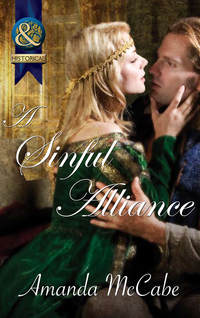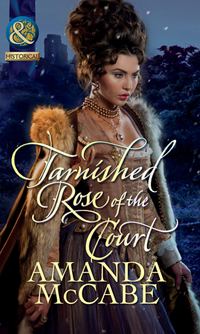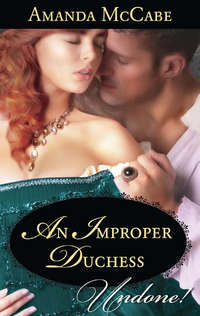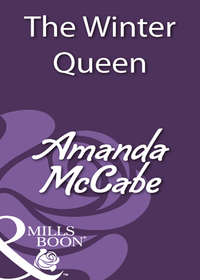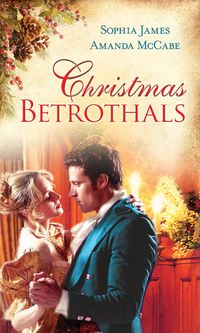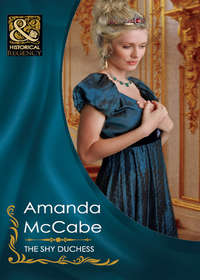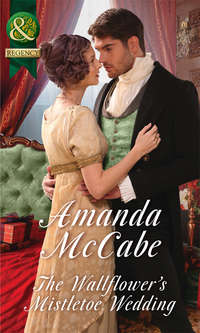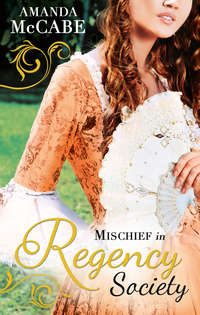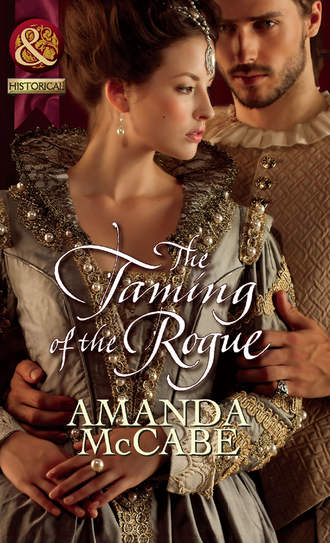
Полная версия
The Taming of the Rogue
She wouldn’t allow it.
She scooped up his rumpled shirt from where he had dropped it on the clothes chest and tossed it to him. Despite his wound, he caught it neatly with one hand.
‘We all need you here, Robert,’ she said. ‘Your careless behaviour endangers us all.’
He laughed, and Anna thought she heard a bitter note to it, underneath the dismissive carelessness. Did he see what he did to them? Did he care at all?
He pulled the shirt over his head, covering the bandage, and said, ‘I have disappointed you again, fairest Anna. But don’t despair—I will have the new play to you within a fortnight. I’m sure even I can stay healthy and whole for that long.’
Anna wasn’t so sure. Temptations lurked around every corner in Southwark, and Rob wasn’t one to deny them. Her doubt must have shown on her face, for Rob laughed again.
‘Perhaps you would want to lock me up in your garret?’ he said. ‘I could slip you the pages under the door as I write them, and with every scene you could reward me with bread and ale—and whatever else you might care to bestow.’
With kisses, maybe, like his bawds? Exasperated, Anna threw the rest of the bandages at his head. ‘Don’t tempt me, Robert Alden—I may do just that!’ She whirled round and dashed from the room, his laughter following her as she went.
‘I look forward to being your captive, Anna,’ he called. ‘I can think of so many ways we could pass the time.’
She slammed the door behind her, cutting off his infuriating laughter, and made her way back to the open air and light of the theatre. The actors were all gathered there, milling around on stage as if waiting to see what would happen next.
‘What are you all loitering about for?’ Anna shouted. She was thoroughly fed up with actors and their wild doings. ‘We have a performance this very afternoon and there is no time to waste.’
They quickly went back to their rehearsal, and Anna returned to her sewing in the gallery, trying to get back to the day’s many tasks. But her hands were trembling so much she could scarcely wield the needle.
Chapter Three
As soon as Anna was gone from the tiring-house, the door safely shut between them, Rob slumped back down onto the chest. His shoulder felt as if it was on fire, the salve burning as it knitted the flesh back together, and his mind was heavy with weariness after the long night he had just passed.
He rubbed his hands hard over his face and pushed back the rumpled waves of his hair. It had been meant to be a simple task—a quick one. Go to a party, wait until everyone was ale-shot, and find the documents. Compared to what he usually did for Queen and country, it was simpler than crossing the lane.
Only it had not worked out quite that way. He had the papers—but he had also got a dagger to the shoulder.
‘Surely it is time for me to retire,’ he said, and then gave a wry laugh. No one retired from the service of Secretary Walsingham—unless it was in a wooden box to the churchyard. But, God’s teeth, he was growing weary of it all.
He prodded at his shoulder and felt the ridge of the neat bandage there against his skin, which made him think of Anna Barrett. He remembered the cool softness of her hands on his bare skin as she nursed him, the cautious light in her jewel-green eyes as she examined the wound. She smelled of roses and fresh sunlight, and her body was so slender and supple, had felt so warm against his as she’d leaned close. So close he could almost have slipped his arm around her waist and pulled her to him for a kiss …
She was beautiful, with her glossy red-brown hair and pale skin, the lush, full pink lips that seemed to contradict her prickly distance. Rob had long been a great appreciator of female beauty and softness, and the moment he’d met her all those months ago he’d been drawn to her. There was passion under her coolness, a flash of raw fire that beckoned to him.
But she was untouchable. Everyone in Southwark said she had no desire for men, or for women, either. She was above all of them, chilly and glittering, like the North Star. All the men who tried their luck with her were laughingly turned away.
So Rob did not try. There were too many willing women for him to waste his time on other than Anna Barrett. But he did like to tease her, flirt with her, just to see that rose-pink glow rise in her cheeks, feel the spark of her temper. He liked even more to touch her whenever he could, in those rare moments she let him close enough, and feel the heat of her body.
He dared do no more. Anna Barrett was above him, just as that star was, in this sordid world of Southwark, but not of it, and he wouldn’t drag her down into his work. He was not that heartless, surely, not quite that far gone. Not yet.
Yet there were moments, flashes of something he usually kept hidden even from himself, when he wondered what it would be like to have her admiration. To kiss those soft lips and feel her respond to him, open to him.
Given the way she’d run from the tiring-house, today was not that day. And he had to keep it that way. She had to go on thinking he had been wounded in a tawdry quarrel over some Doll Tearsheet—just as she had thought so many times before. She had to see him as the face he presented to the world: a careless brawler.
‘Your careless behaviour endangers us all,’ she had said, and she was more right than she knew. The White Heron was the closest thing to a real home Rob had known for a long time, the Lord Henshaw’s Men his only family now. He had to protect them.
He laced up his shirt, pushing away the lingering pain in his shoulder. He could smell Anna’s rosewater perfume on the linen folds, and he dragged in a deep breath to hold it with him for one more fleeting instant. That bitter weariness was pressing down on him, but he couldn’t rest now, couldn’t take refuge in the softness of Anna Barrett. He had to deliver those papers.
There was a quick knock at the door, and Rob shook away the last of the pain to gather the concealing cloak of a careless player around him again. The two sides were so much a part of him now it was as easy as changing papier-mâché masks on stage. But could it all become too easy? Did he lose his real self in the switch?
‘Rob, are you there?’ a man called. ‘They told me you were hiding in the tiring-house.’
It was his friend and sometimes co-conspirator Lord Edward Hartley. ‘Come in, Edward,’ Rob said. ‘Obviously I am not hiding so very well.’
Edward pushed open the door and slipped inside, closing it behind him. As usual he was dressed in the very height of Court fashion—black velvet doublet slashed with crimson satin, a short cloak embroidered with gold thread, and a plumed cap. He looked like a bright peacock dropped into the drab, dusty backstage area of the theatre.
But Robert knew the steel that lurked behind that jewelled velvet. Edward had saved his life many times, as Rob had saved his in turn. They both served the same cause. With him, Rob could relax his ever-constant vigilance just a bit—just for a moment.
Edward held out a rough pottery jar. ‘I heard tell there was a brawl of some sort this morning. I thought perhaps you could use this.’
‘Word does travel fast,’ Rob said as he reached for the jar and uncorked it. The heady smell of home-made mead rose up in a thick, alcoholic cloud, and he tipped his head back for a long drink. It burned going down, doing its task most effectively. ‘I thought you had gone off to the country with your beauteous Lady Elizabeth.’
At the mention of his lady-love, Edward grinned like a passion-struck fool. ‘Not as of yet. Our departure was delayed for a few days, which is a good thing if you need stitching up after a fight.’
Rob wiped the back of his hand across his mouth. ‘No stitching up required this time. Mistress Barrett mended me well enough.’
‘Did she, now?’ Edward’s brow arched as he reached for the jar to take a drink of his own. ‘And does the fair Mistress Barrett know the true nature of this quarrel?’
Rob remembered the look on Anna’s face as she told him how his behaviour affected them all. He took another drink of the mead, but even that couldn’t quite erase the memory of her frown. ‘She knows I quarrelled over a whore’s payment. Like everyone else.’
Edward nodded. ‘And the papers?’
‘I have them.’
‘Shall I go with you to deliver them to Seething Lane, then? Maybe with two of us there will be no more trouble on the way.’
‘Perhaps tomorrow.’ Rob corked the jar again, and resisted the strong urge to dash it to pieces on the flagstone floor. It was his damnable quick temper that had got him here in the first place. He had vowed never to let it get the better of him again, yet it had led to the bloody fight—and almost revealing himself to Anna. ‘There is something I must do first.’
Chapter Four
Anna bent her head over the ledger books spread across her desk, trying to concentrate on the neat rows of numbers tabulating that day’s receipts from the theatre. She usually loved keeping the accounts—in the end, figures always added up to the correct answer. Unlike human life, they were regular and predictable. She understood them.
Tonight, though, the black ink numbers kept blurring before her eyes. Images kept flashing through her mind, bright and vivid, of Robert Alden and that blood on his shoulder. The solemn look in his eyes as he looked up at her, as if he hid ancient and terrible secrets deep inside—secrets he had only allowed her to glimpse for that one moment before he concealed them again.
‘Fie on it all,’ she cursed, and threw down her quill in frustration. Tiny droplets of ink scattered across the page. Of course Robert had secrets. Everyone in their world did. It was a dirty, crowded life, and everyone had to survive any way they could. She saw it every day. No one emerged with clean hands or hearts, least of all those who relied on the theatre for their living. She held enough secrets and regrets of her own—she didn’t need anyone else’s.
Yet something in his eyes had moved her today, quite against her will. Rob Alden was a handsome, merry devil, known to be as quick with a mocking laugh as with his rapier. Today he had looked old and sad, as if he had seen far too much. As if one too many friends had suddenly turned enemy.
Then that glimpse had been gone, and he was hidden again behind his handsome face. But she couldn’t forget that one flashing, sad look.
‘Don’t be such a gaping fool,’ Anna said out loud. She was as bad as that sobbing bawd in her cheap yellow dress, weeping over Rob in the street. There was no time for such nonsense, no time for soft emotions—especially over a rogue who did not deserve them and would only laugh at them. Actors were good at counterfeiting love onstage, and rotten at living it.
She carefully scraped the spilled ink off the vellum and tried to return to the neat columns of figures. Shillings and pounds—that was what she needed to ponder now, what she could understand.
Suddenly the house’s front door, just beyond her sitting room, flew open, and her father stumbled in. Through the door she caught a glimpse of the White Heron across their small garden, the theatre dark and quiet now in the gathering twilight. The afternoon’s revels were long ended by this hour, the crowds gone back to their homes across the river or to more dubious pleasures in the nearby taverns and bawdy houses.
It seemed that was where her father had been, as well. Tom Alwick’s russet wool doublet was buttoned crookedly, his hat set askew on his rumpled grey hair. Even from across the room she could smell the cheap wine.
Anna carefully set aside her pen and closed the account book. Her precious quiet hour was done. There would be no time for reading poetry now, as their usual evening routine began. At least her father, unlike her late husband, was an affable drunk. Tom was more likely to regale her with wild tales before he fell to snoring in front of the fire. Sometimes he would cry for her mother—dead since Anna was a toddler of three, but never forgotten by her father.
Her late husband, Charles Barrett, had used to slap her and break their plate before insisting on his marital rights. So, aye, she much preferred this life here with her father.
‘Anna, my darling one!’ Tom cried, stumbling on the raised threshold of the sitting room. He reached out with one flailing hand to catch his balance, nearly tearing down an expensive painted cloth from the panelled wall.
Anna leaped up from her chair and caught him by the shoulders before he could ruin their furnishings. She knew too well where every farthing came from to pay for their comfortable house. He leaned against her as she led him to the chair by the fire.
‘Are you working again?’ he asked, as he fell back onto the embroidered cushions.
Anna moved her sewing basket away and gently lifted his feet onto a stool as she said, ‘I was going over the receipts for today’s performance. The takings were down a bit, though Lord Edward Hartley took his usual box for the performance.’
‘The Maid’s Dilemma is an old play,’ Tom said. ‘We’ll have rich takings indeed once we open Rob’s new play, I swear it.’
‘If we open it,’ Anna murmured as she tugged off her father’s boots. They were damp and muddy from his lurch through the Southwark streets, and she set them by the fire to dry.
‘What do you mean, my dearest? Rob has never been late delivering a play! And they are always great earners. Audiences love them.’
Of course they were great earners, Anna thought. Women came flocking to see them, hoping for a glimpse of the writer acting onstage himself, and they always paid extra to sit in the upper galleries, rent cushions and buy refreshments.
Anna couldn’t really blame them. His plays were extraordinary, no matter how maddening the man was. They were wondrous tales of the powers and dangers of kingship, of betrayal and love and revenge, and deep, stirring emotions. They were written with beautiful, poetic words rarely heard on the stage, and the audience was always in floods of tears by the end.
Even Anna, who saw plays every week, was always moved by Robert Alden’s words, and the new, wondrous worlds they created. They were worth the trouble he caused.
Usually.
She sat down in the chair across from her father’s. ‘His last play had delays being passed by the Master of the Revels. It was weeks before we had a licence to stage it. He grows careless with his plots.’
Tom waved this away with an airy gesture, and almost toppled out of his chair. ‘Audiences love a bit of controversy. Making them wait only makes them even more excited to see it.’
‘Not if you’ve already paid good coin for a play we can’t use!’
‘All will be well, Anna, I am sure. You’re working too hard of late. It makes you worry too much.’
‘I like the work.’ It kept her busy—and kept her hidden at the same time.
Tom narrowed his eyes as he gave her a sharp look, the wine haze lifted for an instant. ‘You are too young and comely to bury yourself in account books all the time. You should think about suitors again.’
Anna laughed bitterly. ‘One husband was enough, Father.’
‘Charles Barrett was a stupid brute, and I was a fool to let you marry him,’ Thomas said. ‘But not all men are like him.’
Nay—some were like Robert Alden. Too handsome and witty for their own good, or for any woman’s good at all. ‘I am content as I am. Don’t we have a comfortable life here?’
‘My life has certainly been more comfortable since you came back. This house is wonderfully kept, and my profits from the businesses have doubled.’
‘Because I make you invest them instead of spending them all on wine and ale.’
‘Exactly so, my dearest. But I should not be selfish and keep you here.’
‘I told you, I am quite well where I am, Father. I promise. Now, what about some supper? I can send Madge to the tavern for some venison stew, and there is fresh bread …’
‘Oh, I almost forgot!’ Tom cried. ‘I did invite some people to dine with us. They will surely be here at any moment.’
Anna sighed. Of course they would. Her father was always inviting guests for a meal, or a game of cards which usually went on until morning. It was seldom they had a quiet evening alone.
‘Then I will have Madge fetch some extra stew, and perhaps a few pies,’ she said, and went to ring the bell for the maid. At least her father’s guests seldom expected grand fare. ‘Who is coming this evening?’
‘Some of the actors, of course. Spencer and Cartley and Camp, and perhaps one or two of their friends. We need to discuss the new play and the casting.’ Tom paused, never a good sign. ‘And Robert. I may have asked him, as well, when I saw him at the Three Bells earlier.’
‘Robert was at the Three Bells?’ Anna asked in surprise. She would have thought after his adventures of last night he would have eschewed taverns and gone back to his lodgings to collapse.
She should know better. No matter what occurred, he always kept moving. It was almost as if he was one of his own heroic creations.
But she had touched him today, been near to him—looked into his eyes for that one fleeting, vulnerable instant. She knew how warmly human he truly was.
‘I heard there was a bit of a disturbance this morning,’ her father said. ‘But he was writing in his usual corner of the tavern, so all must be well. We can press him about the new play when he arrives.’
Anna braced her palm on the carved fireplace mantel, staring down into the crackling flames. Robert Alden was coming here tonight. She didn’t want to see him again so soon after mending his wound. How could she look at him across her table and keep that secret?
How could she stop herself from reaching out to touch him?
‘Father—’ she began, only to be interrupted by a pounding at the door.
‘I will go,’ Tom said as he tried to push himself out of his chair.
Anna shook her head. ‘Nay, I will go. It seems Madge is otherwise occupied.’
She took a deep breath as she made her way slowly to the door, steeling herself to see Rob again and to remain expressionless. Yet it was not Rob who waited there on the threshold, it was Henry Ennis, another of the actors in Lord Henshaw’s Men.
As he smiled at her and bowed, Anna pushed away that unwanted and unaccountable pang of disappointment and said, ‘Master Ennis. We haven’t seen you at the White Heron in a few days.’
Henry’s smile widened and he reached for her hand to bestow upon her fingers an elaborate salute that made her laugh. Next to Robert, Henry Ennis was the most handsome of the company, slim and angelically blond where Rob was dark as the devil. Henry always seemed to be laughing and cheerful, as open and easy as a fine summer’s day, with no hidden depths or concealed secrets.
Anna always enjoyed being around him. He made her laugh along with him, and forget her duties and worries. He never made her feel flustered or confused, as Rob always did.
Against her own will, she glanced past Henry’s shoulder to the shadowed garden behind him. But no one was there.
‘My beauteous Anna,’ Henry said as she took his arm to lead him into the corridor. ‘It has pained me greatly to be away from you, but as I had no role in the last production I thought it best I travel to the country to visit my family. They have been neglected of late.’
‘Family?’ Anna said in surprise. In their strange, vagabond London life she often forgot the actors might have real families tucked away somewhere. They formed their own bonds among others of their kind, with her father’s house as their temporary hearth.
Did Rob have a family, too? A wife and blue-eyed children, in a cosy village somewhere?
‘My mother and sister in Kent,’ Henry said. ‘I have not seen them in many months.’
‘Then I hope you found them well?’
‘Very well. A bit bored, mayhap—they always long for tales of London.’
Anna gave him a teasing smile. ‘I’m sure they especially long for tales of your London courtships. Does your mother not wish for handsome grandchildren to dandle on her knee?’
Henry laughed ruefully, his handsome face turning faintly pink. ‘Perhaps she does. I should so like …’ His words trailed away and he shook his head, turning away from her.
‘Should so like what, Henry? Come, we are friends! Surely you can talk to me?’
‘I should so like for her to meet you, Anna. She would like you very much, I think,’ he said shyly.
Anna was so shocked by his quiet, serious words that she stopped abruptly in the dining-chamber doorway. Henry wished for her to meet his mother? But surely their friendship was only that—a friendship? Though he was kind and sweet-natured, and so handsome …
She studied him in speculation in the flickering half-light of the smoky candles. Aye, he was handsome, and so earnest as he watched her. Perhaps friends was a fine place to start. Friends was safe and pleasant—not a threat to her calm serenity, the quiet life she had worked so hard to earn and build.
But as she looked at Henry Ennis she saw not his pale grey eyes, glowing with wary hope as he watched her, waiting for—something. She didn’t feel his arm under her hand. She saw Robert’s bright blue eyes mocking her as she bandaged his shoulder, staring deep, deep into her hidden soul and letting her glimpse his for one moment. It was his bare, warm skin she felt.
Anna made herself laugh, and tugged Henry towards the dining chamber. ‘I am not the sort of lady mothers like very much, Henry. And I fear I shall never leave the city now. The country air is far too clean and sweet for me after so long in London.’
Henry seemed to take her hint, and he laughed merrily, as if that instant of seriousness had never been. Perhaps she had merely imagined it. It had been a long, strange day, after all.
‘And my mother will never come to London,’ Henry said. ‘She is quite certain villains lurk on every street corner, ready to cut an unwary throat. So perhaps you will never meet, after all.’
‘Perhaps your mother is right to keep her distance,’ Anna murmured. And far wiser than she was herself, living in the very centre of such a perilous world. But she had no desire to leave; this was her home, the only place she could belong. A quiet country hearth was not for her.
There was another knock at the door, and Anna left Henry at the table with her father so she could hurry and answer it. More of the actors waited for her there, far more than her father claimed to have invited. They greeted her exuberantly, kissing her cheek and lifting her from her feet in fierce hugs, before they dashed into the house looking for food and drink. It seemed her father’s ‘some people’ invited to dine included the whole company, along with their always voracious appetites and endless need for wine.
Anna was accustomed to such evenings. Her father’s hospitality was boundless, and his memory for such practical matters as how much food to serve was non-existent. Anna sent the servants for more dishes and jugs of wine from the tavern, and the evening passed in a swift, happy blur as she made sure everyone was served and there was enough bread and stew.
Finally she was able to collapse by the sitting-room fire with her own goblet of wine. She tucked up her feet on her father’s footstool, listening to the shouts and laughter from supper. Her father would be busy until dawn, and then some of the actors could carry him up to his bed.
Anna reached into her sewing basket for the new volume of poetry she had bought at one of the stalls at St Paul’s churchyard just that day. It was an anonymous sonnet cycle about the deep love of a shepherd for an unreachable goddess he’d once glimpsed at her bath, called Demetrius and Diana. Everyone was reading and talking of it, and she could see why. The words and emotions were beautiful, so filled with raw longing and the sad realisation that such a love was impossible. Life was only what it was—lonely and cold—and there was no escape from that, even through passion.


